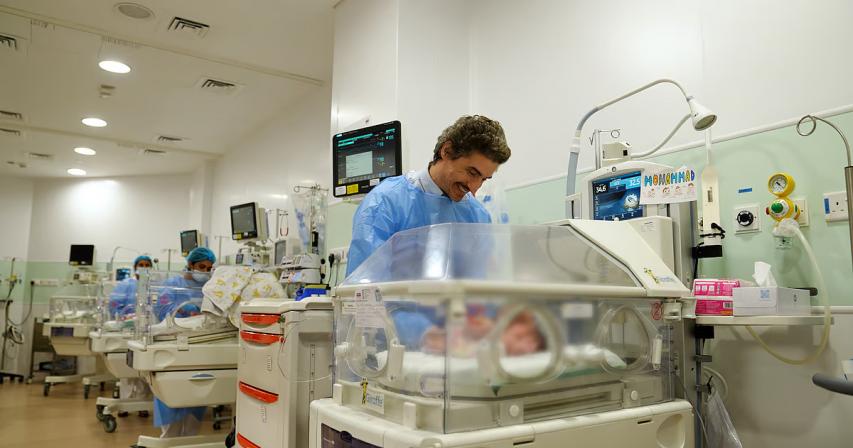UAE: Baby born at 23 weeks fights odds, goes home after twin dies 10 days post delivery

Most doctors consider it too early for survival, but at just 23 weeks of pregnancy, Mahra, a 26-year-old woman, delivered twins. She lost one of the twins, Ali, just 10 days after the delivery.
Ali was just under the size of the palm of his hand and weighed just under 500 grams, Mohammed, on the other hand, was lighter than a loaf of bread.
Mohammed lived for a bit longer than his twin and was set to undergo a complicated journey through the Neonatal Intensive Care Unit, aka the NICU Burjeel Specialty Hospital in Sharjah.
“Losing Ali was devastating, but for the sake of my surviving son, I had to remain strong, and devote my life to plant love and hope,” said Mahra.
Ali's premature birth could be attributed to premature uterine contractures and internal infection which was so serious that it led to early labour infection which in science is termed as infection in Mahra. Taking into consideration all his conditions, Mohammed can be qualified as an ultra preemie and would surely fall under the list of someof the weakest preterm babies ever.
According to Dr. Yamen Fayez Elmughanni, Consultant Pediatrician and Neonatologist & Head of the NICU at Burjeel Specialty Hospital, Sharjah, babies born at 23 weeks face incredibly low survival rates, estimated to be just 15 percent to 30 percent. This figure relies heavily on the pregnancy's conditions as well as the care received.
120-Day Fight
In the beginning, Mohammed had to tackle various life-threatening challenges like difficulties with breathing, keeping his body temperature in check, and feeding. To make things more complicated, he also survived a life-threatening Gram-negative bacterial infection which even full-term infants would find difficult to survive.
“We did watch him for his neurological, visual, digestive, and respiratory systems, which are often issues with micro-preemies,” Dr Elmughanni shared. “The good news is that he did not suffer from many complications which truly gave us hope for the baby’s healthy growth.”
To stabilize Mohammed's condition, the NICU team leveraged the latest respiratory and cardiovascular support systems alongside nutritional therapy, advanced infection control, brain protection treatments, and managed pain. All these efforts were part of giving him advanced care that is often needed for infants.
Never losing hope, Mahra visited Mohammed every single day and cared for him however she could. From bubbling milk for him to talking and holding him, she would do it all. In her effort to soothe him, she would even recite healing verses from the Quran.
“The days felt long, and with each passing day, my connection to him intensified,” she said, recalling the wait. “The whole family excitedly anticipated his visit and yearned to spend time with him. Yet, after more than a hundred days, some folks had completely forgotten I had a baby. I went to work and pretended everything was alright.”
The nurses at the NICU nicknamed Mohammed the “boss baby,” due to his sheer strength and willpower to fight through the extreme odds stacked against him.
“It was Mohammed’s fight that earned him the ‘boss baby’ nickname,” said nurse Anne from the Special Care Baby Unit.
Mohammed was finally discharged after 120 days of intensive care, breathing independently and weighing over 2 kg. The journey from a feeble, palm-sized infant to a fully-loaded baby has undergone drastic changes. This is nothing less than a miracle.
He will be coming into the clinic for regular follow-up appointments to monitor the child’s milestones.
In a touching note to other parents in the same situation, Mahra said, “Accept God’s will. Exercise patience. Love your children and support them. Work alongside the medical team.” “Maintain breastfeeding, but also shower the child with love no matter what their condition is.”






Comments